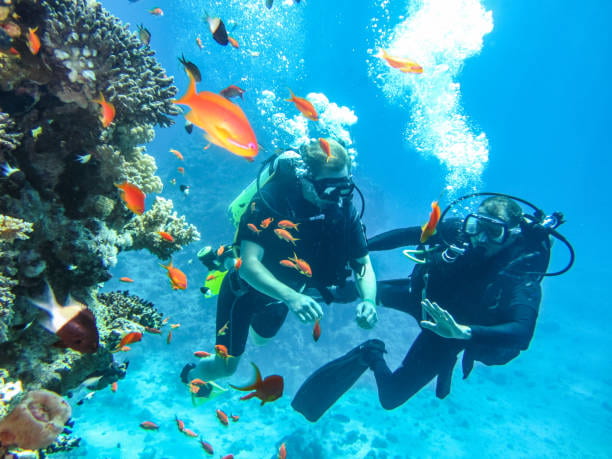
The Incredible Andaman Islands are the perfect choice for recreational scuba diving. The maximum allowable dive depth limit is 40 meters (130 feet) for recreational scuba divers in Andaman, however technical or commercial divers can go beyond. You get to explore different species of sea dwellers and coral reefs at different dive depth levels. Many rare marine species tend to live in deep waters and can’t be witnessed in shallow waters.
Scuba Diving in Andaman is a whole new experience whether you are a beginner or an experienced diver. Everyone gets to witness captivating and adventurous marine life on each dive. How many meters scuba divers can dive depends on their skill, experience, and certification levels.
Let’s have a look at who is eligible to dive at various scuba diving depths
Beginners or Non-swimmers (12 meters)
A layman who knows nothing about scuba diving and just wants to experience underwater marine life is also eligible to dive under the supervision of a dive instructor. The person must be of legal age (Either a minimum of 12 years or a maximum of 50 years) and should be physically and mentally fit to dive. Beginners or nonswimmers are allowed to dive a maximum depth of 12 meters (40 feet) provided they are comfortable at that depth.
Open water diver (18 meters)
A person must have to acquire a scuba diving certification to dive at a depth of 18 meters. A diver who is open-water certified is eligible to go beyond 12 meters and up to a depth of 18 meters (60 feet). The OWD diver can freely dive and explore underwater marine life with a dive buddy.
The SSI open water diver course in Andaman includes 6 open water dives (2 shore + 4 deep) with 20 confined water skills and costs INR 29000 per person excluding additional taxes. You will need at least 4 days with us on the Island to complete your open-water certification.
Advanced Open Water diver (30 meters)
A person who has completed an advanced open-water certification is eligible to dive up to a depth of 30 meters (100 feet). Advanced open-water divers are eligible to dive beyond 18 meters and up to a depth of 30 meters. A person who completed open water certification is eligible for an advanced open water diver course.
Deep Diving Speciality (40 meters)
It is the advanced level of scuba diving certification that allows you to dive to the deepest point in recreational scuba diving. A person who is certified in a deep diving speciality course is eligible to dive up to a depth of 40 meters (130 feet). A person who completed open water certification is eligible for a deep diving speciality course.
Possible health hazards of deep sea diving
Deep diving does entail some risks and may cause some sort of health issues. Unplanned and inexperienced diving may cause decompression sickness, arterial air embolism, drowning, and of course nitrogen narcosis. However, skilled, pre-planned, and experienced diving can avoid such risk factors. Let’s have a look at them one by one.
Decompression sickness: Decompression sickness is also known as generalized barotrauma or the bends. It is a sort of injury that occurs when there is a rapid decrease of pressure surrounding your body and usually occurs to deep sea divers who ascend to the surface too quickly. Decompression sickness results in gas bubbles forming in the blood vessels and tissues and the condition can be fatal if not treated quickly.
Arterial air embolism: Arterial air embolism is also referred to as gas embolism and occurs when there is one or more air bubbles enter in vein or Artery and block it. Air embolism can be either venous air embolism or Arterial air embolism. When an air bubble enters in vein, it is called a venous air embolism and when it enters an Artery then is called Arterial air embolism.
The condition of a diver may worsen when the air bubbles travel to the brain, heart or lungs and may cause a heart attack, stroke, and respiratory failure. It is a serious medical condition and proper treatment is recommended.
Nitrogen narcosis: The problem of Nitrogen narcosis usually affects deep sea divers. The underwater breathing gas is a mixture of oxygen, nitrogen, and other gases and can alter when the divers dive beyond 100 feet. It causes kind of unusual symptoms of intoxication when inhaled. The symptoms of nitrogen narcosis include poor judgment, disorientation, short-term memory loss, overconfidence, trouble concentrating, and so on.
The complications of Nitrogen narcosis are fairly common and temporary but it doesn’t mean that you can’t have any serious health implications. Most severe symptoms of the condition may cause someone to go into a Coma or even die.